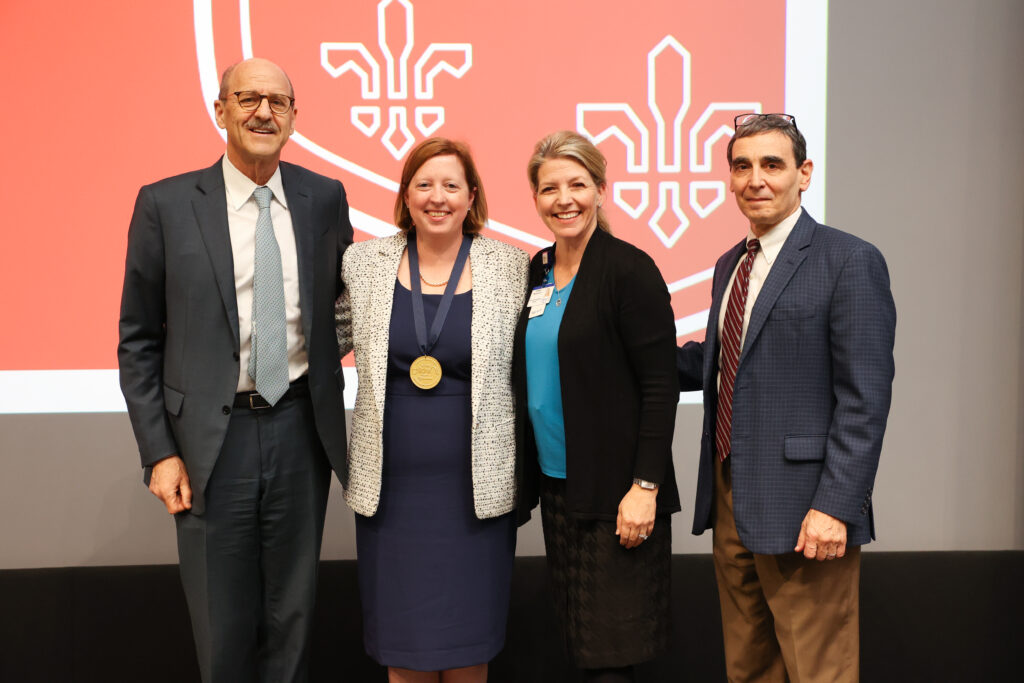Megan A. Cooper, MD, PhD, a professor of pediatrics, has been installed as the Anthony R. French, MD, PhD, Professor in Pediatrics. A celebration to mark the event took place Monday, March 4, 2024 in the Eric P. Newman Education Center.
Cooper is chief of the Division of Pediatric Rheumatology/Immunology at Washington University Department of Pediatrics. She is a board-certified pediatric rheumatologist and an internationally recognized physician-scientist in the Pediatric Rheumatology and Primary Immunodeficiency communities. Since 2018 she has been the inaugural director of the Jeffrey Modell Diagnostic and Research Center for Primary Immunodeficiencies at St. Louis Children’s Hospital. She is the scientific director of the Center for Pediatric Immunology, which recently received $5.3 million in funding from the Children’s Discovery Institute. The center’s primary goal is to provide scientific infrastructure for the investigation and therapy of pediatric inborn errors of immunity, focusing on the discovery of molecular (genetic) disease mechanisms and novel therapies.
Cooper earned her bachelor’s degree from the College of Wooster before matriculating into the Medical Scientist Training Program at The Ohio State University. She did her thesis work in the laboratory of Michael Caligiuiri where her discoveries in the laboratory included defining new subsets of human NK cells relevant to immunotherapy. She joined the Pediatric Residency Program at St. Louis Children’s Hospital in 2004, followed by fellowship in Pediatric Rheumatology at Washington University. Her post-doctoral work under the mentorship of Wayne Yokoyama, MD, included seminal contributions to the NK cell field with the initial identification and characterization of cytokine-induced memory-like NK cells — now in clinical trials for pediatric and adult malignancies.
Cooper has built a robust NIH-funded research program incorporating both basic and translational studies. Her laboratory’s basic science work is focused the metabolic regulation of NK cell activation and understanding how these pathways can be modulated to improve NK cell function. Her translational immunology program has focused on identifying novel genetic causes of immunodeficiency and immune dysregulation in previously undiagnosed pediatric patients. Her laboratory led the discovery and mechanistic characterization of two new pediatric inborn errors of immunity including STAT3 gain-of-function and TLR8 gain-of-function and contributed to the discovery of multiple other inborn errors of immunity through her many collaborations worldwide. This work has led to the early diagnosis and treatment of children with these genetic diseases of immunity, including the use of targeted therapies now starting in clinical trials. Cooper’s work has led to over 100 highly-cited original scientific articles, reviews and book chapters, and numerous invited lectures around the world. Her research in human immunology was recognized in 2019 with the prestigious Emil Unanue Prize for Innovative Research in Immunology.
Cooper was elected to the American Society of Clinical Investigation (ASCI) in 2023 and serves as an elected councilor for the Clinical Immunology Society and the Society for Pediatric Research (SPR). She is an associate editor for the Journal of Clinical Immunology and has served on multiple NIH and foundation study sections. She is strongly invested in mentorship and the development of academic physicians and scientists. In addition to being a dedicated mentor for PhD and post-doctoral fellows in her laboratory, she previously served as program director for the Pediatric Rheumatology fellowship and currently serves as an associate director for the MSTP program at Washington University. She is, also, a leader in our Institute of Clinical and Translational Sciences (ICTS), serving as lead of the Precision Health Function, which focuses on building institutional infrastructure to catalyze genomic research.
About Anthony R. French, MD, PhD

Anthony R. French, MD, PhD, has built a distinguished career as a researcher, clinician and mentor. He is the Alan L. Schwartz, PhD, MD, Professor in Pediatrics, and professor of Biomedical Engineering and Pathology & Immunology at Washington University. He was chief of the Division of Pediatric Rheumatology and Immunology from 2017-2023. French is co-scientific director of the Children’s Discovery Institute and serves as vice chair for Physician Scientist Training in the Department of Pediatrics.
He earned his bachelor’s degree in Chemical Engineering from the University of Minnesota. He became interested in biomedical research as an undergraduate and did his MD and PhD training at the University of Illinois at Urbana-Champaign. His PhD research was focused on experimental studies and mathematical modeling of endosomal sorting of epidermal growth factor in the laboratory of Doug Lauffenburger. French subsequently did his pediatric residency at Mayo Clinic, during which time he became interested in immunology. He came to Washington University for his fellowship in pediatric rheumatology and did his postdoctoral work with Wayne Yokoyama, MD, studying natural killer (NK) cells in the context of herpesvirus and poxvirus infections.
French’s research program has long focused on the role of NK cells in early innate immune responses with an emphasis on mechanisms regulating NK cell proliferation and homeostasis during viral infections. He has a particular interest in functional NK cell defects in humans with unusually severe and/or recurrent herpesvirus infections and the contribution of dysregulated NK cell responses to the onset of pediatric autoimmune disorders, such as juvenile dermatomyositis. His work is motivated by the hypothesis that a clearer understanding of the regulation of NK cell functional responses may lead to novel therapeutic interventions in autoimmune disorders and in host defense against large DNA viruses.
He has excelled in mentoring trainees and physician-scientists, serving on more than 30 PhD thesis committees and previously co-directing one of the Pediatric Research Units (2013-2017). He is the recipient of several prestigious awards including of the Basil O’Connor Scholar Award from the March of Dimes, and he was elected to the Society of Pediatric Research in 2010 and the American Society for Clinical Investigation in 2014.
This endowed professorship will ensure that the curiosity, compassion and scholarship exemplified by French will continue to inspire the next generation of pediatric scientists.
